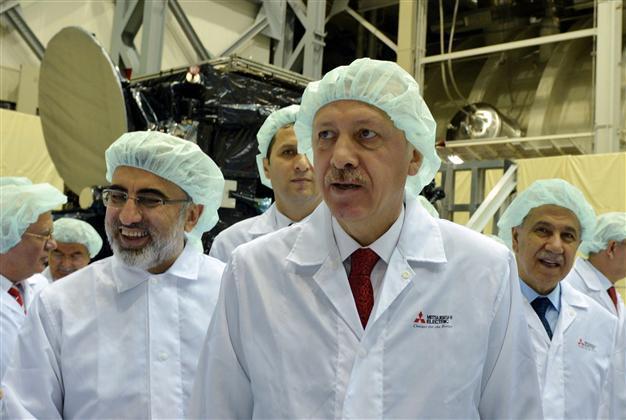Turkish energy minister denies uranium enrichment intention
TOKYO

Turkish PM Erdoğan is flanked by Energy Minister Yıldız (L) during a visit to Mitsubishi's Kamakura plant in Kamakura, suburban Tokyo, Jan. 8. AFP photo
Energy Minister Taner Yıldız denied Turkey had any interest in enriching uranium through the nuclear deal with Japan, claiming a demand for uranium enrichment allowance was only aimed at learning about the nuclear fuel production process.“We don’t have any project regarding nuclear fuel and [uranium] enrichment,” Yıldız told a group of reporters on a plane flying from Japan to Singapore on Jan. 8, Anadolu Agency reported.
“There are three or four stages regarding nuclear fuel process and being involved in any of those stages or Turkey’s desire to be involved in them should not be perceived as nuclear fuel enrichment,” he said. “Enrichment is a different matter.”
Ankara reportedly demanded allowance for uranium enrichment and plutonium extraction within the framework of a $22 billion nuclear power plant and technology export deal inked with Tokyo, a Japanese daily reported Jan. 8, quoting a Japanese Foreign Ministry official as saying.
The clause at issue allows Turkey to enrich uranium and extract plutonium, potentially creating nuclear material for weapons, according to the report.
However the Turkish Energy Minister sought to rule out those claims, saying “the text of the nuclear agreement is aimed at all transactions to be used for peaceful purposes.”
“As we don’t have any demand for uranium enrichment in Turkey, there will not be any supply,” he stressed.
He said Turkey wants to participate in some processes of nuclear fuel, but it definitely will not seek to produce fuel itself.
“We are not aiming at generation for sure. It is a pre-made decision,” he stated, underlining Turkey only wants to do something with uranium if it could be extracted from Turkey.
“We want to enter a business related to that. France can do this and we will look if we can do something with France,” Yıldız explained.
“Besides, we are members of NATO and the U.N., as well as signatory of many international treaties. We wouldn’t have such a concern,” he said.
Turkish Prime Minister Recep Tayyip Erdoğan, who was in Japan Jan. 5 for a three-day visit, and his Japanese counterpart, Shinzo Abe, have signed a $22 billion deal on the nuclear plant project.
A joint venture involving Japan’s Mitsubishi Heavy Industries has won an order to construct Turkey’s second nuclear plant in the Black Sea province of Sinop.
Yıldız said Turkey has no problem with finding nuclear fuel supply, but added fuel procurement is already the responsibility of the operating company.
The minister also noted the second stage for Turkey’s second nuclear power plant have been almost completed with the signature of the intergovernmental agreement between Turkey and Japan on Oct. 29, during Abe’s Istanbul visit.
“Now there is the signature of implementation agreements with companies ahead. We believe we will be able to finish this process by the sixth month of the year, because the states are left out of the way and private companies like Mitsubishi step in,” he stated.
















